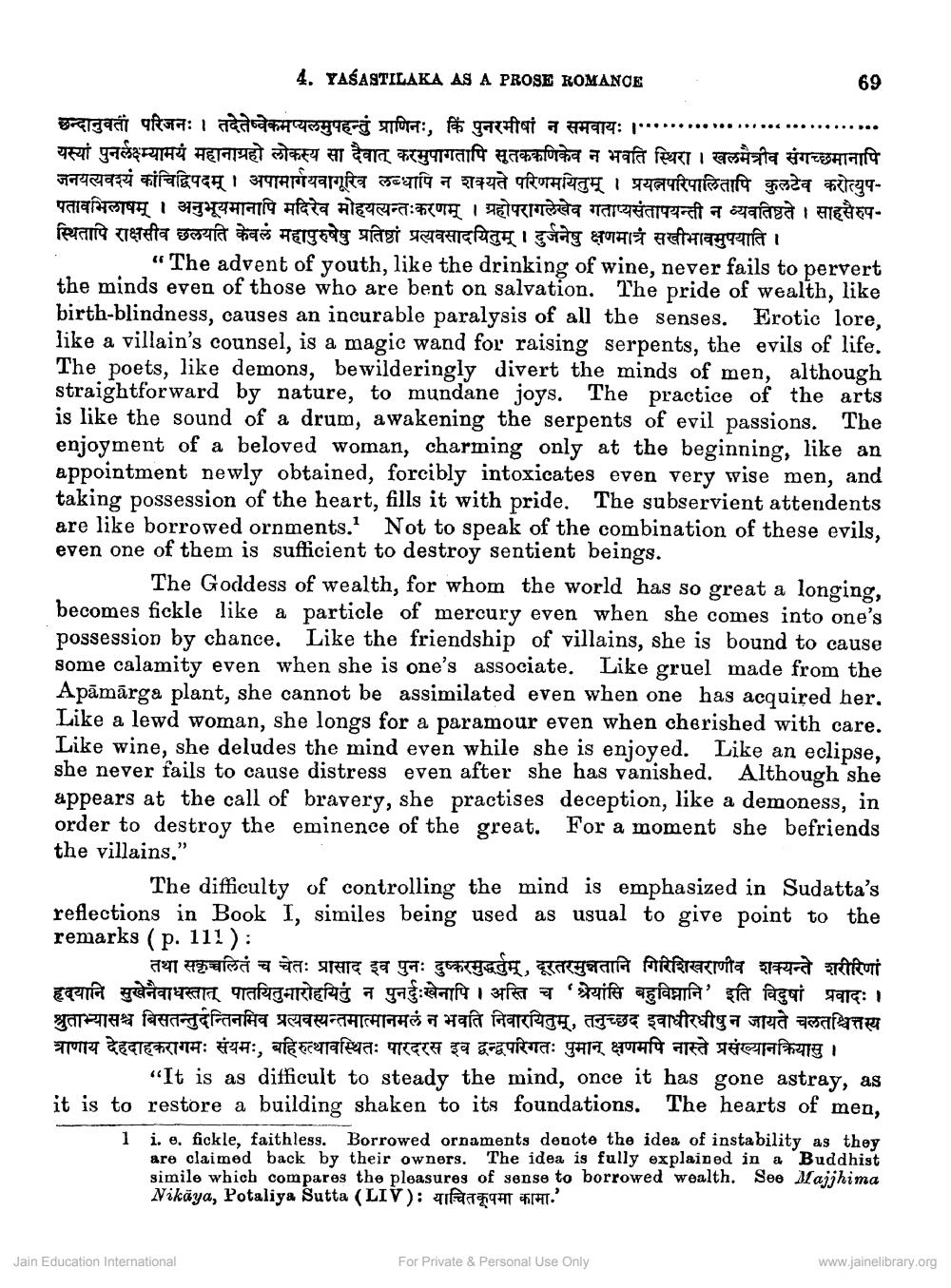________________
4. YASASTILAKA AS A PROSE KOMANCE
.
TL
छन्दानुवती परिजनः । तदेतेष्वेकमप्यलमुपहन्तुं प्राणिनः, किं पुनरमीषां न समवायः ।..... यस्यां पुनर्लक्ष्म्यामयं महानाग्रहो लोकस्य सा दैवात् करमुपागतापि सूतककणिकेव न भवति स्थिरा । खलमैत्रीव संगच्छमानापि जनयत्यवश्यं कांचिद्विपदम् । अपामार्गयवागूरिव लब्धापि न शक्यते परिणमयितुम् । प्रयत्नपरिपालितापि कुलटेव करोत्युपपतावभिलाषम् । अनुभूयमानापि मदिरेव मोहयत्यन्तःकरणम् । ग्रहोपरागलेखेव गताप्यसंतापयन्ती न व्यवतिष्ठते । साहसैरुपस्थितापि राक्षसीव छलयति केवलं महापुरुषेषु प्रतिष्ठां प्रत्यवसादयितुम् । दुर्जनेषु क्षणमात्रं सखीभावमुपयाति ।
"The advent of youth, like the drinking of wine, never fails to pervert the minds even of those who are bent on salvation. The pride of wealth, like birth-blindness, causes an incurable paralysis of all the senses. Erotic lore, like a villain's counsel, is a magic wand for raising serpents, the evils of life. The poets, like demons, bewilderingly divert the minds of men, although straightforward by nature, to mundane joys. The practice of the arts is like the sound of a drum, awakening the serpents of evil passions. The enjoyment of a beloved woman, charming only at the beginning, like an appointment newly obtained, forcibly intoxicates even very wise men, and taking possession of the heart, fills it with pride. The subservient attendents are like borrowed ornments. Not to speak of the combination of these evils, even one of them is sufficient to destroy sentient beings.
The Goddess of wealth, for whom the world has so great a longing, becomes fickle like a particle of mercury even when she comes into one's possession by chance. Like the friendship of villains, she is bound to cause some calamity even when she is one's associate. Like gruel made from the Apāmārga plant, she cannot be assimilated even when one has acquired her. Like a lewd woman, she longs for a paramour even when cherished with care. Like wine, she deludes the mind even while she is enjoyed. Like an eclipse, she never fails to cause distress even after she has vanished. Although she appears at the call of bravery, she practises deception, like a demoness, in order to destroy the eminence of the great. For a moment she befriends the villains."
The difficulty of controlling the mind is emphasized in Sudatta's reflections in Book I, similes being used as usual to give point to the remarks (p. 111):
तथा सकृच्चलितं च चेतः प्रासाद इव पुनः दुष्करमुद्धर्तुम् , दूरतरमुन्नतानि गिरिशिखराणीव शक्यन्ते शरीरिणां हृदयानि सुखेनैवाधस्तात् पातयितुमारोहयितुं न पुनर्दुःखेनापि । अस्ति च 'श्रेयांसि बहुविघ्नानि' इति विदुषां प्रवादः। श्रुताभ्यासश्च बिसतन्तुर्दन्तिनमिव प्रत्यवस्यन्तमात्मानमलं न भवति निवारयितुम्, तनुच्छद इवाधीरधीषुन जायते चलतश्चित्तस्य त्राणाय देहदाहकरागमः संयमः, बहिरुत्थावस्थितः पारदरस इव द्वन्द्वपरिगतः पुमान् क्षणमपि नास्ते प्रसंख्यानक्रियासु ।
"It is as difficult to steady the mind, once it has gone astray, as it is to restore a building shaken to its foundations. The hearts of men.
i. e, fickle, faithless. Borrowed ornaments denote the idea of instability as they are claimed back by their owners. The idea is fully explained in a Buddhist simile which compares the pleasures of sense to borrowed wealth. See Majjhima Nikāya, Potaliya Sutta (LIV): T he FifT.'
Jain Education International
For Private & Personal Use Only
www.jainelibrary.org




